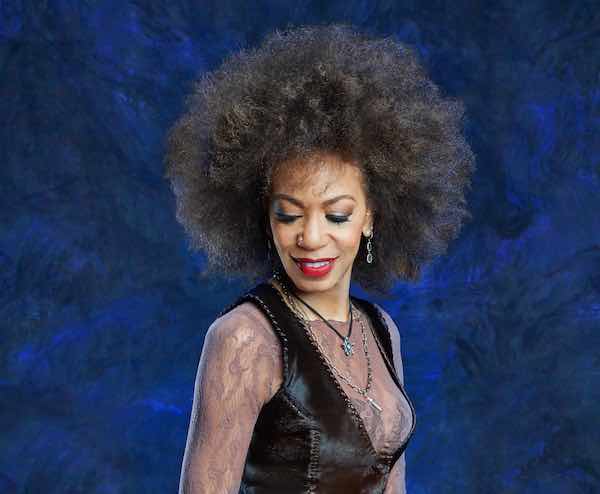Jan 13, 2026 2:09 PM
More Trump-Kennedy Center Cancellations
The fallout from the renaming of the John F. Kennedy Center for the Performing Arts to include President Donald…

The fusion of musical ideas on Cindy Blackman Santana’s latest album “transcends any kind of veil that we put between us,” the drummer said.
(Photo: Maryanne Bliham)When drummer and bandleader Cindy Blackman Santana makes music, it’s in pursuit of something deeply spiritual.
Soulfulness has defined Blackman Santana’s playing since her breakout in the mid-1980s, and it’s the lifeblood of Give The Drummer Some, her joyful new jazz-fusion record featuring a cast of A-listers, including her husband of 10 years, Carlos Santana.
Growing up in Yellow Springs, Ohio, Blackman Santana attributes her early attraction to the drums to something divine. As a toddler, her mother would find Blackman Santana patting out rhythms on whatever household objects were around. After begging for years, she was gifted a drum set at the age of 7.
“[My mother] thought I would outgrow it,” Blackman Santana said. “But I never did. ... I think it is something that my soul has always wanted to do.”
Owning her own kit opened up a new world for her, the drummer said, especially after she found Miles Davis and Ahmad Jamal records in her father’s collection, offering up an inkling of what was possible on the instrument.
In her early twenties, after studying at Berklee School of Music, Blackman Santana moved to New York and started catching performances of such drum heroes as Tony Williams, Elvin Jones and Art Blakey. Remarkably, she became close enough with Blakey to call him “Papa” and babysit his kids. She also received a special gift from Jimmy Cobb—the cymbal he’d received from Williams years earlier when the younger drummer joined Davis’ quintet.
While Blackman Santana clearly earned her straightahead jazz stripes—as her blistering, dynamic and polyrhythmic percussion feature on Give The Drummer Some’s “Mother Earth” so readily conveys—the new record truly is a fusion effort. Consisting mostly of the bandleader’s originals, the album highlights Blackman Santana’s adaptability, garnered from her years in Lenny Kravitz’s band, as well as her experience supporting an array of artists from soul singer Joss Stone to avant-metal guitarist Buckethead.
While several tracks on the album, like the sassy “She’s Got It Goin’ On,” were shaped to be radio-friendly, others, like “Miles Away,” exist comfortably outside of the pop world.
Her ability to blend genres also highlights a spiritual approach to the music. Though Blackman Santana became a member of the Bahá’í faith in her teens and has studied Kabbalah, her current mode of spirituality is a nondenominational one, based in removing encumbrances, and finding truth and love through music.
“I feel that music, in general, is the supreme communicator, which crosses all barriers that human beings have implemented upon ourselves around the world ... . [M]usic touches people and it just transcends any kind of veil that we put between us,” she said. “If you look at everything from a spiritual perspective, then we’re not going to have the issues that we have, you know? We won’t hate on each other, we won’t hurt each other, we won’t fight each other.”
This philosophy not only imbues Give The Drummer Some with a sense of transcendence, but of celebration and communion with listeners and with other musicians featured on the album.
John McLaughlin, the jazz-fusion pioneer who first connected with Blackman Santana on stage at the 2011 Montreux Jazz Festival, describes playing music with the drummer as “taking a walk in the cosmos.” They embark on a transcendent stroll when McLaughlin appears on “We Came To Play,” a fierce riff-based rock tune anchored in an improvisational tête-à-tête between the guitarist and bandleader.
The joyful bond between Blackman Santana and her husband is conveyed on the celebratory “Fun Party Splash,” the guitarist’s high-energy soloing meeting Blackman Santana’s raucous drumming and smoky voice, as she sings, “Have no fear/ Love is here.”
Even on songs that might not seem overtly light, like “Social Justice” and “Change Is In Your Hands,” Blackman Santana remains focused on love and connection. It’s one of the aspects of the 17-track record that her husband most adores.
“The album has the frequency vibration and energy to heal people, because a lot of people need hope and courage; a lot of people need the opposite of doom and gloom,” the guitarist said. “This album, to me, it’s like a sweet pinch.” DB
This story originally was published in the November 2020 issue of DownBeat. Subscribe here.

Belá Fleck during an interview with Fredrika Whitfield on CNN.
Jan 13, 2026 2:09 PM
The fallout from the renaming of the John F. Kennedy Center for the Performing Arts to include President Donald…

Peplowski first came to prominence in legacy swing bands, including the final iteration of the Benny Goodman Orchestra, before beginning a solo career in the late 1980s.
Feb 3, 2026 12:10 AM
Ken Peplowski, a clarinetist and tenor saxophonist who straddled the worlds of traditional and modern jazz, died Feb. 2…

The success of Oregon’s first album, 1971’s Music Of Another Present Era, allowed Towner to establish a solo career.
Jan 19, 2026 5:02 PM
Ralph Towner, a guitarist and composer who blended multiple genres, including jazz — and throughout them all remained…

Rico’s Anti-Microbial Instrument Swab
Jan 19, 2026 2:48 PM
With this year’s NAMM Show right around the corner, we can look forward to plenty of new and innovative instruments…

Richie Beirach was particularly renowned for his approach to chromatic harmony, which he used to improvise reharmonizations of originals and standards.
Jan 27, 2026 11:19 AM
Richie Beirach, a pianist and composer who channeled a knowledge of modern classical music into his jazz practice,…